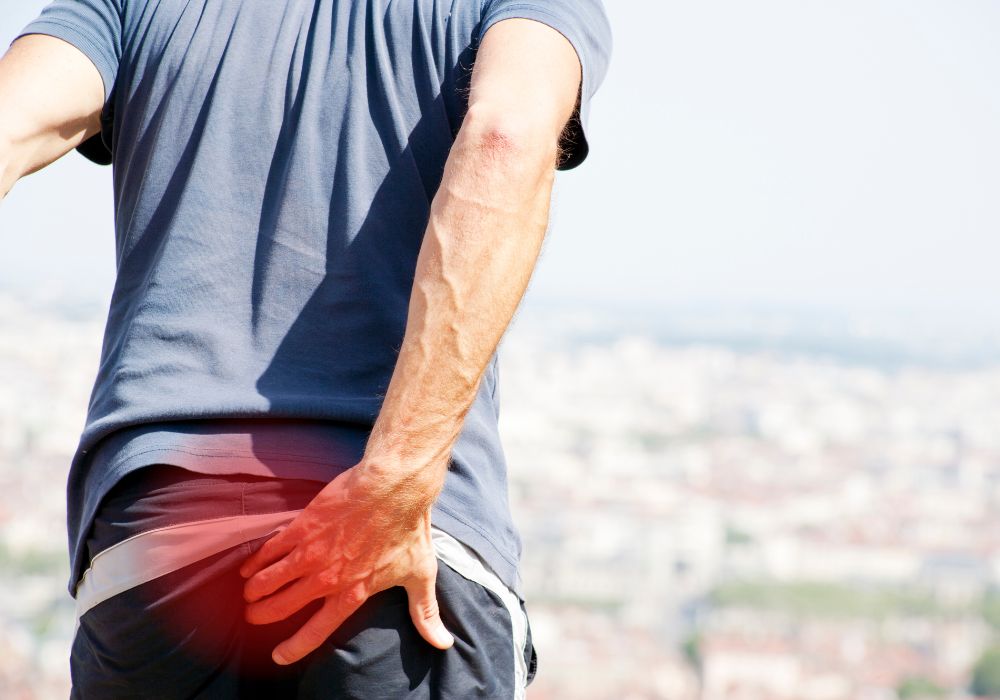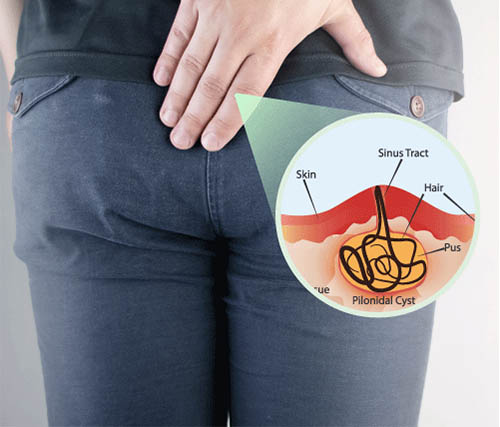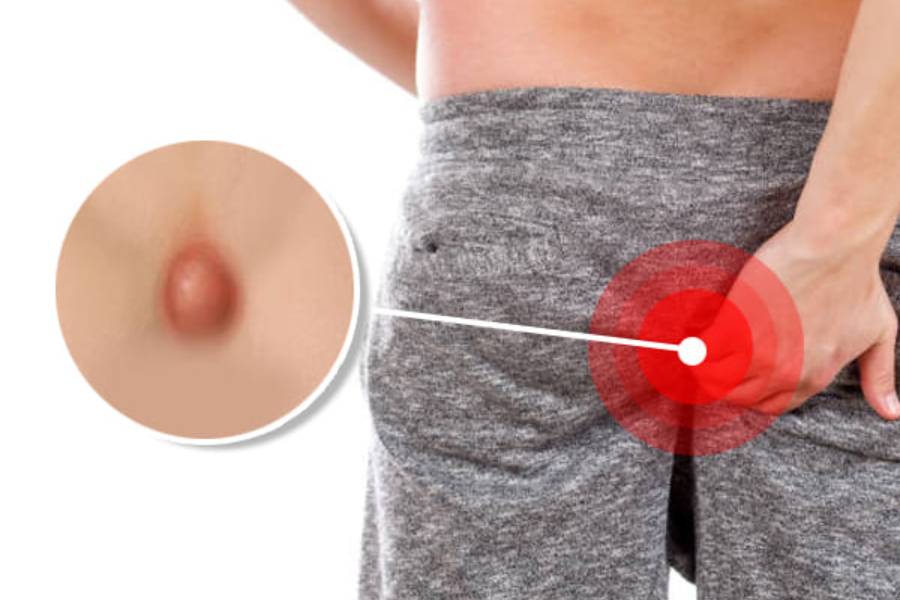Book an Appointment
Best Pilonidal Sinus treatment in Hyderabad and
advanced laser treatments
Pilonidal sinus, also known as pilonidal cyst or sacrococcygeal fistula, is a condition in which a small, painful cyst or abscess forms at the
base of the spine, in the cleft between the buttocks. The condition is more common in men than in women, and usually affects people
between the ages of 15 and 40.
Causes of Pilonidal Sinus:
The exact cause of pilonidal sinus is not known, but it is thought that the hair follicles in this area are infected and inflamed. The condition is often associated with poor hygiene, prolonged sitting, and excessive sweating. A genetic predisposition or localised trauma can also be the cause.
Diagnosis of Pilonidal Sinus:
The diagnosis of pilonidal sinus is typically made based on a physical exam and medical history. The doctor will examine the affected area and look for signs of inflammation, infection, or discharge. They may also order imaging tests, such as an ultrasound or MRI, to get a better look at the area.
USFDA - Approved Procedure
Support in Insurance Claim
No-Cost EMI
1 Day - Hospitalization

Types of Pilonidal Sinus:
There are two types of pilonidal sinuses: acute and chronic.
- Acute pilonidal sinusitis occurs suddenly and is often accompanied by pain, redness, and swelling in the affected area.
- Chronic pilonidal sinusitis is a long-term condition that can cause recurrent cysts or abscesses in the area.
Treatment of Pilonidal Sinus:
Treatment for pilonidal sinus depends on the severity of the condition. Mild cases may be treated with home remedies such as warm compresses, over-the-counter pain medication, and keeping the area clean and dry. More severe cases may require medical treatment, including antibiotics, drainage of the cyst or abscess, and surgery.
Surgery options for Pilonidal Sinus:
Pilonidal sinus surgery is typically recommended for chronic or severe cases of pilonidal sinus. The most common surgical option is excision and primary closure, which involves removing the cyst and surrounding tissue and closing the wound with stitches. Other surgical options include flap closure, in which healthy tissue is used to cover the wound, and marsupialization, in which the cyst is opened and left to heal from the inside out.
Prevention methods for Pilonidal Sinus:
There are several steps that can be taken to prevent pilonidal sinus. These include practicing good hygiene, keeping the area clean and dry, avoiding prolonged sitting, wearing loose-fitting clothing, and avoiding tight underwear. Regular exercise and maintaining a healthy weight may also help prevent the condition.


Postoperative care for Pilonidal Sinus:
After pilonidal sinus surgery, it is important to follow the doctor’s instructions for postoperative care of the pilonidal sinus. This may include keeping the area clean and dry, taking pain medication as prescribed, avoiding strenuous activity, and attending follow-up appointments with the doctor to monitor the healing process. In some cases of the pilonidal sinus, a wound dressing or drain may be used to promote healing and prevent infection.
In conclusion, pilonidal sinusitis is a condition that might result in discomfort and pain in the affected area. Home remedies can be used to cure mild instances, but more severe cases might need medical attention or surgery. Maintaining good hygiene and taking preventative measures can help prevent pilonidal sinusitis. For a faster recovery and to avoid complications after surgery, it’s important to pay attention to what the doctor’s postoperative care suggests.
Don’t let pilonidal sinus hold you back any longer! Book an appointment at Hyderabad Laser Surgery Hospital, the best pilonidal sinus treatment hospital with 30+ years of experienced doctors. Our dedicated team specializes in proctology surgeries, ensuring the highest standard of care and a lower risk of hospital-acquired infections.
Take advantage of our 24/7 doctor service, insurance acceptance, private AC rooms, and the availability of female doctors to cater to your comfort and privacy. Plus, enjoy free post-surgery follow-up care to ensure a smooth recovery.
Choose Hyderabad Laser Surgery Hospital for the most advanced, effective, and comfortable pilonidal sinus treatment. Call now to book an appointment and regain control of your health and well-being!
Testimonial

Gopal M
I was hesitant to undergo surgery, but Hyderabad Laser Surgery Hospital made the entire process easy and stress-free. The staff was friendly and supportive, and the surgery was a success. I am so glad I chose this hospital for my lipoma removal surgery.

Prudhvi

Sravan
Frequently Asked Questions about Pilonidal Sinus:
What is the pilonidal sinus?
What are the causes of pilonidal sinus?
The exact cause of pilonidal sinus is not known, but it is thought that the hair follicles in this area are infected and inflamed. The condition is often associated with poor hygiene, prolonged sitting, and excessive sweating.
How is pilonidal sinus diagnosed?
What are the types of pilonidal sinuses?
There are two types of pilonidal sinus: acute and chronic. Acute pilonidal sinus occurs suddenly and is often accompanied by pain, redness, and swelling in the affected area. Chronic pilonidal sinus is a long-term condition that can cause recurrent cysts or abscesses in the area.
What are the treatment options for the pilonidal sinus?
Pilonidal sinus treatment depends on the severity of the condition. Mild cases may be treated with home remedies, such as warm compresses, over-the-counter pain medication, and keeping the area clean and dry. More severe cases may require medical treatment, including antibiotics, drainage of the cyst or abscess, and surgery.
What surgical options are available for the pilonidal sinus?
The most common surgical option is pilonidal sinus excision and primary closure, which involves removing the cyst and surrounding tissue and closing the wound with stitches. Other surgical options for the pilonidal sinus include flap closure, in which healthy tissue is used to cover the wound, and marsupialization, in which the cyst is opened and left to heal from the inside out.
Can pilonidal sinuses be prevented?
Yes, there are several steps that can be taken to prevent pilonidal sinus, including practicing good hygiene, keeping the area clean and dry, avoiding prolonged sitting, wearing loose-fitting clothing, and avoiding tight underwear. Regular exercise and maintaining a healthy weight may also help prevent the condition.
What steps can be taken to prevent pilonidal sinus?
To prevent pilonidal sinusitis, it is important to practice good hygiene, keep the area clean and dry, avoid prolonged sitting, wear loose-fitting clothing, and avoid tight underwear. Regular exercise and maintaining a healthy weight may also help prevent the condition.
What should I expect after surgery for pilonidal sinus?
After surgery for the pilonidal sinus, it is important to follow the doctor’s instructions for postoperative care of the pilonidal sinus. This may include keeping the area clean and dry, taking pain medication as prescribed, avoiding strenuous activity, and attending follow-up appointments with the doctor to monitor the healing process. In some cases, a wound dressing or drain may be used to promote healing and prevent infection.
How can I ensure proper postoperative care for pilonidal sinus?
Subscribe Here
![]()
Unlock Exclusive Health Content and Offers: Subscribe and Join Our WhatsApp Group Today!
By subscribing you agree to our Privacy Policy.

